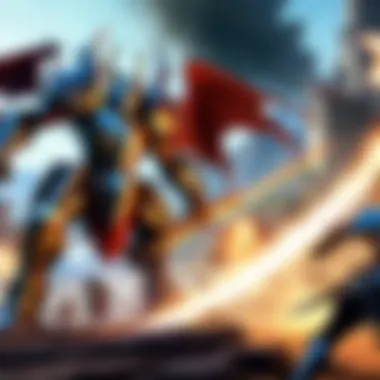Top MMOs to Play Today: A Comprehensive Guide


Intro
The world of Massively Multiplayer Online (MMO) games is vast, complex, and full of choices for gamers today. These online universes are not simply playgrounds filled with pixels. They are extensive realms where players connect, collaborate, and compete. The right MMO can deliver not just entertainment, but a rich tapestry of social interactions and storytelling. As we examine this landscape, we will focus on current titles that stand out due to their unique gameplay mechanics, engaging communities, compelling graphics, and innovative designs.
Each MMO presents its own universe. Players are often drawn to the unique features that set these games apart. What is the community like? How immersive is the game's environment? What mechanics drive the gameplay? Understanding these elements is crucial when choosing an MMO that aligns with individual preferences.
Let's delve further into the current favorites to establish a granular view of the genre. Each title we explore will offer insights into what makes them captivating and worthy of attention.
Understanding MMOs
Understanding MMOs is crucial for players who want to navigate the vast and diverse landscape of Massively Multiplayer Online games. MMOs provide immersive experiences where numerous players interact within a shared virtual world. The importance of mastering the fundamentals of these games extends beyond mere gameplay; it enables players to select the titles that align with their personal interests and gameplay styles. This comprehensive look at MMOs helps demystify their features, mechanics, and community dynamics. By understanding the core elements of MMOs, players can engage more meaningfully with the gaming community and enjoy a richer gaming experience.
Defining Massively Multiplayer Online Games
Massively Multiplayer Online Games, commonly known as MMOs, are online games that support large numbers of players simultaneously in a persistent world. They can vary in genre, including fantasy, sci-fi, or even historical themes. The defining characteristic of MMOs is their ability to connect potentially thousands of players in real-time. This expansive player base enriches the gaming experience, allowing for interactions that create a sense of community and shared adventure. Each player can develop their character and skills and collaborate with others or compete in various activities, ranging from questing to player-versus-player combat.
Key Characteristics of MMOs
MMOs are distinguished by several key characteristics that contribute to their unique appeal:
- Persistent Worlds: The game world continues to exist and evolve even when the player is offline, offering a continuous experience. This leads to a feeling that the player's actions have lasting consequences.
- Large Player Base: MMOs facilitate connections among large groups of players, allowing for social interaction, cooperation, and competition. This aspect enhances player engagement and creates a vibrant ecosystem.
- Character Progression: Players often have the opportunity to develop their characters over time through various means, such as gaining experience points, mastering skills, and acquiring gear. This progression can be highly rewarding and keeps players invested in their characters.
- Quests and Events: MMOs typically offer a variety of quests and events for players to participate in. These activities encourage exploration and provide goals for players, further enriching the gameplay experience.
- Community and Social Structures: Guilds, clans, and groups play a vital role in fostering player interactions. MMOs create a social environment where players can communicate, collaborate, and build friendships.
Types of MMOs
The diversity within the realm of Massively Multiplayer Online games is significant, serving various player desires and interests. Understanding the types of MMOs is critical as it allows players to make informed decisions based on gameplay preference, social interactions, and immersive experiences. Each type of MMO caters to unique aspects of gaming, whether it be role-playing, competitive battles, or exploration. Moreover, recognizing these distinctions helps potential players identify games aligned closely with their gaming identity and social engagement style.
Role-Playing MMOs: An Overview
Role-Playing MMOs, often abbreviated as RPGs, invite players to step into fictional worlds where they can create and develop their characters. These games typically feature expansive narratives and character progression systems. Players immerse themselves in quests, battles, and complex storylines.
Some popular examples include "World of Warcraft" and "The Elder Scrolls Online". These titles offer rich lore, diverse character classes, and customization options. Players not only engage in combat but also interact with each other, forming parties or guilds for overcoming challenges. The cooperative aspect of role-playing MMOs enhances the social experience, making it essential for players who enjoy community interaction.
Massive PvP Titles
Massive Player versus Player (PvP) MMOs focus primarily on competitive gameplay. These titles facilitate large-scale battles where players face off against each other in various formats, contributing to a thrilling atmosphere. Tactical skill, strategic thinking, and quick reflexes define success in these environments.
An example of this can be found in "Guild Wars 2", known for its dynamic combat system and large-scale battlegrounds. Players are motivated not just by winning but also by the opportunity to earn recognition and prestige within the gaming community. PvP-focused MMOs also often have rankings and tournaments, which can deepen engagement and investment in the game.
Sandbox vs. Theme Park Experiences
When discussing the environment in which players interact, it is useful to differentiate between Sandbox and Theme Park MMOs.
Sandbox MMOs offer an expansive world where players generate their own content. Freedom defines the experience, allowing players to craft unique stories and interactions. Examples include "EVE Online", where the economy and warfare are player-driven.
Conversely, Theme Park MMOs provide structured experiences, guiding players through quests, missions, and linear narratives. Titles like "Final Fantasy XIV" exemplify this style, offering a well-defined path for the player while ensuring entertaining gameplay.


Recognizing the difference between these types helps players choose the environment that most suits their playstyle. Whether one prefers the free creation of a sandbox or the guided adventures typical of theme parks can significantly affect overall satisfaction with their gaming experience.
Evaluating the Best MMOs
Evaluating the best MMOs is essential for players who seek to maximize their gaming experiences. With a crowded genre featuring numerous options, the process of narrowing down choices becomes critical. Different MMOs cater to distinct audiences and preferences, which makes it important to assess them on various levels and criteria. Players can determine which games are aligned to their tastes while also gaining insights into current trends and emerging technologies that can enhance their gameplay.
Criteria for Selection
Gameplay Mechanics
Gameplay mechanics form the backbone of any MMO. They determine how players interact with the world and each other. A game with responsive mechanics allows for a more engaging experience. For example, dynamic combat systems or skill-based challenges can make gameplay feel more rewarding. Choosing a game with robust gameplay mechanics can lead to deeper player immersion and satisfaction. However, if mechanics are overly complex, they can become a barrier to entry for new players.
Community Interaction
Community interaction is another vital aspect when evaluating MMOs. Games that foster healthy and vibrant communities often create a more fulfilling experience for participants. This includes features such as guilds, chat systems, and forums. These unique characteristics promote teamwork and camaraderie among players. Moreover, a strong community can enhance the longevity of a game. Conversely, toxic environments can deter players and diminish the overall experience. Therefore, considering community dynamics is crucial for those who value social interactions in gaming.
Visuals and Graphics
Visuals and graphics play a significant role in attracting players. High-quality graphics enhance the aesthetic appeal of a game, contributing to immersion. Well-designed worlds with impressive visual elements can captivate players and encourage exploration. However, while stunning graphics are attractive, they must complement gameplay rather than overshadow it. Games that rely solely on visuals without strong gameplay might attract players initially but can lose them in the long term.
Innovation
Innovation in MMOs can set a title apart from the competition. This can manifest through unique gameplay elements, storytelling techniques, or technological advancements. Games that introduce novel features often garner interest and may even redefine norms within the genre. The drawback is that not all innovations are successful. Unfinished or poorly implemented new mechanics can lead to player frustration. Evaluating how a game embraces innovation is key to understanding its potential appeal.
Recent Trends in MMO Gameplay
Monetization Models
Monetization models, such as subscriptions or free-to-play formats, have significant implications for player experience. These models can dictate accessibility and how players interact with the games. Games embracing free-to-play with microtransactions may attract a larger player base but may also face scrutiny over fairness and balance. Regular changes in these models can alter gameplay dynamics and affect long-term engagement, making it an essential aspect to consider when evaluating MMOs.
Cross-Platform Play
Cross-platform play is increasingly popular in the MMO space. It allows players on different devices to play together. This broadens the player base and ensures that friends can connect regardless of their chosen platform. However, the discrepancy in performance and controls across platforms can sometimes create imbalance issues in gameplay. Thus, while cross-platform play can enhance community engagement, it requires careful balance to ensure fairness.
Community Events
Community events are vital for maintaining engagement within MMOs. They encourage players to come together, participate, and celebrate in-game achievements. Events can take various forms, such as competitions, festivals, or even narrative expansions. While these occurrences foster a sense of belonging and excitement, they can also become overwhelming for some players if the frequency is too high. Overall, effective community events can greatly enhance the gaming experience by reinforcing player connections.
Highlighting Top MMOs
In this section, we will critically examine some of the most significant MMOs available today. The focus will be on understanding what makes these games stand out in a crowded market. Each game offers unique elements that cater to diverse player preferences. By highlighting the best titles, we can better appreciate the mechanics, narratives, and communities that define the MMO experience. This understanding is crucial for anyone looking to invest time and effort into a virtual world.
Exploring World of Warcraft
World of Warcraft, often abbreviated as WoW, has been a cornerstone of the MMO genre since its launch in 2004. The game combines rich storytelling with expansive gameplay. Players venture into immersive environments filled with quests and adventures.
WoW's open world invites exploration and discovery. Its lore is deep, reflecting years of narrative development. The variety of character classes and races also gives players numerous options for customization. Community engagement is fostered through guild systems, allowing players to form bonds and collaborate on challenges.


This game remains relevant due to constant updates and expansions. The latest expansion, Dragonflight, introduced new gameplay elements and thoughtful adjustments to existing mechanics.
The Appeal of Final Fantasy
Final Fantasy XIV has gained a loyal following since its relaunch as A Realm Reborn in 2013. Its narrative-driven quests set it apart from typical MMOs. Players immerse in an engaging storyline complemented by sequential character development. The game includes diverse job systems, offering flexibility in playstyles.
The game's graphical fidelity is especially noteworthy. Visually striking environments enhance the overall gaming experience. Players often cite the community aspect, noting the friendly environment found in-game. Events and seasonal festivals keep the player base engaged beyond core gameplay.
Recent expansions like Endwalker have added even more depth. This installment expanded the lore and introduced new challenges and classes for players to explore.
The Evolution of Guild Wars
Guild Wars 2 has carved a unique niche within the MMO landscape. It emphasizes a dynamic storytelling experience. Player decisions influence the world and its inhabitants in real-time. Unlike typical questing systems, its events offer a co-operative experience with an emphasis on teamwork.
Combat mechanics in Guild Wars 2 differentiate it from its contemporaries. The action-oriented approach makes gameplay more engaging. Players can switch between classes, promoting versatility in combat roles.
The evolving meta keeps the game fresh. Frequent updates and expansions ensure that players have new content to explore. The most recent expansion, End of Dragons, reflects these changes through new areas and gameplay mechanics.
Emerging Titles Worth Considering
In addition to these veterans in the MMO space, several emerging titles deserve attention. New World by Amazon Games brings a unique blend of PvE and PvP gameplay, highlighting player-driven economies and conflict.
Another notable mention is Lost Ark, which combines MMO mechanics with action-RPG elements. Players can experience combat that feels dynamic and fluid, unlike more traditional MMOs.
Both of these titles reflect current trends in gaming, focusing on player immersion and competitiveness. Ashes of Creation also generates excitement due to its ambitious design. It promises to merge the world-building aspect with player actions, offering a truly adaptive game environment.
As the landscape of MMOs evolves, keeping an eye on these new entries can provide players with fresh experiences that align with their preferences.
Community and Social Interactions in MMOs
Community and social interactions are fundamental aspects of Massively Multiplayer Online games. These components are not merely add-ons; they enhance the overall experience and provide players with opportunities not found in single-player games. Engaging with a community can lead to collaboration, friendship, and a sense of belonging. Furthermore, community dynamics can significantly impact gameplay and individual player satisfaction. Players often seek connections that extend beyond the screen, making social aspects critical to the MMO experience.
Guilds and Clans
Guilds and clans serve as the backbone of social interactions within MMOs. These groups allow players to unite with like-minded individuals who share common goals or interests. Being part of a guild often provides access to exclusive resources and in-game benefits, such as shared loot and cooperative quests. Moreover, guilds can nurture a sense of commitment among members, encouraging regular play and collaboration.
The following are key advantages of joining a guild or clan in an MMO:
- Support for New Players: Veteran members often help newcomers acclimate to the game, enhancing their learning experience.
- Organized Events: Guilds frequently arrange events, whether it be raids or competitions, which enrich gameplay and foster camaraderie.
- Stronger Community Ties: Bonds formed in guilds can lead to lasting friendships, both in and out of gaming contexts.
In-Game Communication
In-game communication is another essential aspect of social interactions within MMOs. Players utilize chat features and voice channels to discuss strategies, share experiences, and build teamwork. Effective communication is often integral to a guild's success, particularly during raids or team-based missions.
Different forms of communication tools exist:
- Text Chat: This is common for casual interactions and strategic discussions, allowing for real-time communication among players who may not voice chat.
- Voice Chat: Platforms like Discord provide a seamless means for players to communicate verbally, which is invaluable during complicated missions.
- Emotes and Actions: Many MMOs include emotes that allow players to express feelings or reactions, adding another layer to interaction without words.


Player-Generated Content
Player-generated content has emerged as a significant aspect of many MMOs. This content can range from custom quests and storylines to unique items and fashion. It not only fosters creativity among players but also enhances the game's universe, often leading to unexpected experiences.
Benefits of player-generated content include:
- Increased Replayability: Unique quests or challenges created by players ensure that no two gaming sessions are identical.
- Community Recognition: Players who create popular content can earn accolades and recognition within the community, fostering a sense of accomplishment.
- Collaborative Creativity: Engaging with other players in the creation of content cultivates teamwork and encourages sharing of ideas.
The strength of community in MMOs transcends mere gameplay. It transforms the environment into a dynamic space where players collaborate, innovate, and build lasting connections.
The Future of MMOs
The landscape of Massively Multiplayer Online games is undergoing continuous transformation. Understanding the future of MMOs is essential for players, developers, and enthusiasts. As technology evolves, so do gaming experiences. This section delves into the upcoming innovations and trends that show promise in shaping the future of MMOs.
Technological Advancements on the Horizon
Technology plays a crucial role in the development of MMOs. Emerging technologies provide new avenues for gameplay and engagement. Key advancements include:
- Artificial Intelligence: AI can be integrated for more adaptive NPCs and personalized experiences.
- Cloud Gaming: This allows for reduced hardware limitations, enabling players to access high-quality MMOs without the need for powerful systems.
- 5G Connectivity: Faster internet speeds can enhance real-time interactions in massive worlds, reducing lag in gameplay.
These advancements lead to significant enhancements in graphics, gameplay mechanics, and player interactions. MMOs will become more immersive as players explore richly detailed worlds, leading to deeper engagement and compelling narratives.
Virtual Reality and MMOs
Virtual reality (VR) represents a pioneering frontier in MMO development. The ability to immerse players fully into virtual worlds can transform gameplay experiences. Existing MMOs like "World of Warcraft" explore VR possibilities, although fully-fledged VR environments are still in development.
Considerations for VR in MMOs include:
- Enhanced Immersion: Players can engage in environments as though they are physically present.
- New Mechanics and Gameplay Styles: Combat and exploration can adapt to VR, introducing new dimensions to interactions.
- Social Dynamics: VR can revolutionize how players interact, allowing for more natural communication via avatars.
While challenges in technology and accessibility remain, the potential of VR is undeniable. The future may see MMOs fostering communities that interact in shared virtual spaces like never before.
Trends in Player Expectations
As gaming communities evolve, so do player preferences and expectations. Players are seeking more from their gaming experiences. Key trends include:
- Diversity and Inclusion: Players expect diverse characters, stories, and settings. Developers are increasingly pressured to represent a broader range of identities and narratives.
- Monetization Ethics: There is heightened scrutiny on in-game purchases and microtransactions. Players prefer models that respect their time and investment.
- Sustainability: Many gamers are advocating for environmentally friendly practices in game development. This includes energy-efficient server use and promoting sustainability through in-game themes.
In summary, the future of MMOs is poised for tremendous growth driven by technology, player engagement, and societal shifts. Innovations will create richer worlds and experiences, meeting the evolving demands of dedicated player bases.
Culmination
The conclusion serves as the critical capstone of this exploration into the world of MMOs. It not only recaps the key insights discussed throughout the article but also emphasizes the ongoing relevance and evolution of these virtual landscapes.
Summarizing the Best Choices
In examining the best MMOs available today, several titles emerge as frontrunners within the genre. World of Warcraft continues to set standards for gameplay mechanics and community engagement despite its age. Final Fantasy XIV captivates players with its intricate storylines and strong visual elements. Emerging titles like New World and Blue Protocol showcase fresh takes and modern innovations that resonate with today's gamers. Each choice offers unique strengths, appealing to diverse audiences within the MMO community.
Final Thoughts on MMO Engagement
Engagement in MMOs goes beyond mere gameplay. It encompasses the social interactions, emotional investment, and shared experiences among players. As technology advances, developers must consider player expectations, particularly around social dynamics and immersive environments. Virtual worlds are more than just spaces for quests; they are vibrant communities that thrive on collaboration and interaction.
Ultimately, the key to selecting an MMO lies in aligning personal preferences with available options. Whether it’s a focus on intricate lore, robust multiplayer features, or artistic visuals, each title offers distinct pathways to explore. The journey in these virtual realms is ongoing and ever-evolving, making it essential for players to stay informed and engaged.



